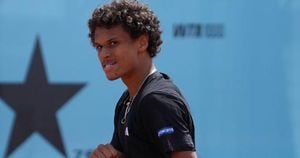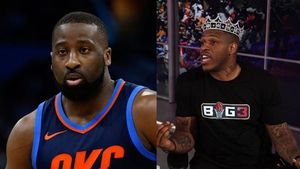On Wednesday evening, March 19, 2025, social media was abuzz when photos emerged of Rayan Cherki interacting with players from the French national team. This sparked considerable speculation regarding his potential integration into the squad, especially following the injury of Marcus Thuram. It was rumored that the young Franco-Algerian star might reinforce the team as they prepared to face Croatia in Split. However, the reality behind these snapshots was more mundane.
Cherki himself posted the pictures on his Instagram, revealing he merely visited the Clairefontaine training center, where he coincidentally met the players before their departure for the Nations League quarter-final on March 20. Despite the excitement surrounding his visit, the French Football Federation has not officially announced any inclusion of Cherki in the first team.
As these events unfolded, the omission of Cherki from the current squad raised eyebrows, particularly given his impressive performance this season with Olympique Lyonnais, where he has scored 8 goals and provided 18 assists across all competitions. Yet, Didier Deschamps, the national team coach, has repeatedly overlooked Cherki, a fact that has not gone unnoticed.
This absence has ignited discussions in various circles, with some commentators arguing that it reflects deeper societal issues. For instance, Karim Zéribi, a former European parliament member, suggested that Deschamps' decisions might indicate a form of anti-Algerian racism, especially seeing that another player, Maghnès Akliouche from AS Monaco, was also absent despite his strong season.
Conversely, sports analyst Daniel Riolo provided a pragmatic explanation for Cherki's exclusion. On the RMC Sport show, "After Foot," Riolo stated, "Deschamps doesn’t like 'fantasists,' a term used to describe players whose creativity on the field might not fit into a rigid tactical framework. He argued that amid established stars like Kylian Mbappé and Ousmane Dembélé, integrating a player like Cherki could be challenging, especially given the latter’s unpredictable style of play.
Riolo noted, "Cherki is quite difficult to place in a team filled with prominent names." This viewpoint resonates with many who observe Deschamps' tendency to favor players with specific strengths—predominantly those who have experience in high-stakes competitions, like the UEFA Champions League.
Another commentator, Florent Gautreau, echoed similar sentiments. He mentioned on RMC that Cherki's profile does not align with what Deschamps looks for in his squad. Gautreau expressed doubt about how well Cherki could integrate defensively, stating that persistent concerns about his defensive contributions played a role in the coach's decision-making. “I understand Deschamps,” Gautreau commented, “because Cherki hasn't met all expectations, unlike Akliouche.”
Riolo also acknowledged that while Akliouche's recent performances have warranted consideration, Cherki’s failure to demonstrate the necessary levels of regularity and fulfil strategic expectations remains problematic. Gautreau suggested that Akliouche’s experience in the Champions League might enhance his appeal for inclusion in the national team, which is a significant factor in Deschamps' criteria.
Despite these deliberations, the absence of Cherki has not failed to attract passionate responses from fans and analysts alike. Many argue that he should have been given a chance. However, the dialogue soon veers from performance metrics into broader discussions about race and representation. For Cherki and those like him in French football, the weight of identity cannot be overlooked.
The ongoing national conversation about ethnicity and the selection process has reignited debates within the football community, illustrating that mechanisms of inclusion and exclusion in sports often reflect societal attitudes. As the upcoming matches approach, the future of players like Cherki remains uncertain, yet their professional narratives are telling. Will Cherki have a chance to spotlight his evident talent on the grand stage of major international tournaments? Only time will tell, but for now, his focus remains on contributing to his club as they aspire for further successes.
For those advocating for Cherki’s inclusion, the challenge is to translate passion into performance, hoping that outstanding individual statistics can indeed sway the selectors. As discussions continue, the landscape of French football and the identities within it endure as dynamic and multifaceted, revealing complexities that are anything but straightforward.







